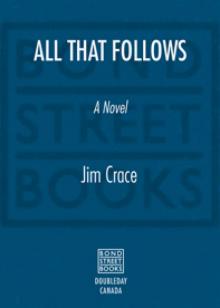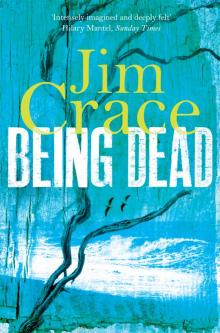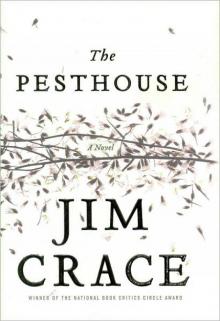All That Follows Read online
Page 12
“You’re using Christian names yourself,” Leonard says, emboldened by his single glass of wine. He only means to defend Nadia.
“I’m usin’ ’em without respect, and that’s the difference. I’m usin’ ’em to differentiate. We’re talkin’ ’bout four Bushes here. You hearin’ me?”
“How could I not?” Leonard can’t decide whether he is exhilarated or annoyed by Maxie’s unembarrassed stridency or simply doesn’t trust it, the mix of street talk, Texas drawl and twang, and campus condescension.
How Nadia’s been taken in by such a showman is an irritation and a mystery.
“So don’t get the British smarties, Leon, por fayvore. Either you are with us or you ain’t.”
“With you where?”
“Not in the silent fuckin’ vigil on the Capitol lawns that those blowhards of the American Civil Liberties Union and Mrs. Pussyfoot of the Texas antiwar coalition have organized. No way. No, sir. We’re gonna take our shit into the House chamber and we are gonna dump it in his lap. AmBush, we’re callin’ it.”
“Sounds good.”
“Too right, it does sound good. And it is gonna be a breeze, my man, ’cos we mean it and we’ve got it organized. Tell him, Nadia. Tell our comrade what we’ve gotten ourselves.”
“Well, number one, Maxie knows a schoolteacher, and number two, she’s been invited to”—she hesitates—“the Bush wife’s speech, and number three, she’s handed us her tickets!”
“Three tickets, Leon. One, two, three.”
10
LEONARD STAYS ANOTHER WEEK, and is relieved to do so. He is not well enough for travel yet. What at first he has presumed to be jet lag and then mistaken as a cold has left him coughing, sneezing, and itching. His eyes are red and weepy. His lips are dry and sore. The lotion Nadia offers him gives no relief. “Welcome to Austin, the City of Sniffs and Tears,” Maxie says, by way of explanation. “What you have gotten is either the last of this summer’s dander fever or the first of this winter’s cedar fever. Allergy planet. We live with it.” Don’t make a fuss, in other words.
Maxim and Leon, or Comrades Gorky and Trotsky, as Nadia refers to them, spend their days—while she is at the college teaching class—training for AmBush, largely at Leonard’s expense, in the Four T’s. As its name implies (Newsweek has judged that Austin ticks all the T’s for “a creative city”—tolerance, technology, talent, taste), it is a bar intended and designed as a watering hole for the neighborhood’s new yuppies, the aspirant professionals, the opinionators and tenure slaves who, since the advance guard of students, gays, and artists softened up and bleached that quarter of the neighborhood, have already started moving in their businesses, their offices, their yard art, and their families. It is here, on the afternoon of his fourth day in Austin, that Leonard unpacks his saxophone. The first time in America.
It’s always a comfort to lift his instrument free from its nesting case, to check and finger its glinting, complex engineering, the key stacks mounted on their axle rods, the pillars, needle springs, hinges, and leverages, the tooling and the soldering, which against all seeming logic unite and conspire to make this “singing tube” the most harmonic of the reeds, and the one most like a human voice, capable of everything from murmuring to oratory. As a child with a “good ear,” Leonard was captivated by the saxophone rather than his parents’ preferred clarinet or oboe, not despite but because of its fussy, varicose technology, the way its fittings and its moving parts dripped and melted from the tube like hardened candle wax. “It’s easy, man, it’s like puffing a cigar. You breathe through it, not into it. Just don’t put the wrong end in your mouth,” he was told when, as a teenager and on an impulse, he bought his first cheap saxophone, the only affordable left-hander in the shop. The salesman was not being entirely frank about how easy playing it would be, but there was some truth in what he said. Despite its size and visual complexity, Leonard found his instrument less complicated to cope with than he feared. As a single-note instrument, its fingering system was relatively simple, and its generous bore and extended octave range flattered even the beginner. Leonard took to it speedily, keen to prove his parents wrong—the clarinet and oboe seemed docile by comparison—but not so keen to let them know how effortless and satisfying his progress was, or how music felt as personal and clandestine as sex. When they were out, he practiced in front of the long mirror in their bedroom, sometimes naked even, serenading his own reflection and never quite forgetting that salesman’s sensuous advice that he should play it like a cigar: the long dense tube that’s held between the fingers, fits between the lips, and puffs out melodies as pungent and weightless as smoke.
Leonard’s current Capitaine—acquired only weeks ago, with money from his inheritance—is a much grander instrument than that first workhorse. He calls it Mr. Sinister, his southpaw friend. It’s customized: everything from the hand engravings on the cone to the details of the mouthpiece at the business end was designed especially for him by a Belgian atelier. Even his reeds have been modified: they’re longer than the usual heartwoods, favoring clarity and nuance over the brittle brightness of that first cheap instrument—and of too much postwar jazz, in Leonard’s view. Just holding it is comforting. Today he’s keen to show it off.
“I’m all set to puff on my cigar,” he says to Maxie, though Maxie seems determined not to pay him any heed, even as his English houseguest clips Mr. Sinister to his neck strap and blows almost inaudibly across the mouthpiece to excite the air column for the first time in America. Maxie’s jealous, Leonard thinks, wishes he could be this cool. He’ll wish it even more when I start playing.
It has been exhausting, living Maxie’s lazy, energetic life—the late mornings and late nights, the noise, the tricky, ranting, high-revved conversations and the intimidating charm that leave Leonard shaken and unnerved, the couple’s almost unrestricted lovemaking, their arguments, the day-for-night in low-lit bars. Leonard is not bored exactly. In fact, he’s more flattered than perturbed to be paraded in the neighborhood and introduced as Maxie’s British friend, for Maxie is to all appearances a local celebrity, a man that everyone—the Mexican construction workers, the prostitutes, the users and suppliers, the painters and jewelers, the storekeepers, the surviving black families—knows by name and seems to like. To be perceived as Maxie’s friend is “the key to the city,” Nadia has said, quick to exaggerate on her lover’s behalf while her lover sits listening, interrupting only to correct and embellish the details. The sight of him and his great stack of hair seems enough to make even the meanest-looking passersby smile, or wave, or stop to talk. He has the happy knack of flattering the listener while referring mostly to himself, and somehow even when he isn’t talking still remaining the focus of attention.
“Maxie’s everybody’s Everyman. The original twenty-four-carat, emblematic, whacked-out, freethinking American.” (Nadia again, quoting herself.) “He’s been to college and dropped out. He’s been in prison—”
“Yeah, way more than once. Property is theft. Violence is the poor man’s repartee and stuff. Carnage, mayhem, mutiny. I like to shake it up a bit, is all. Tumultuous! I do my thing and then I do my time.”
“And now he’s going straight—”
“I’m on parole.”
“He’s been a junkie. Made it clean. He is an immigrant. His parents brought him here from Vancouver when he was three months old.”
“I’m Russian, man.”
“You’re Russian out of Canada.”
“Canucksmontov. It’s all the same. Both realms of ice and snow.”
“He ran away from home when he was seventeen—”
“Sixteen!”
“Correction, sixteen.”
“Fifteen! Fourteen! What’s the difference?”
“He got radicalized the hard way. On the street and in the county jail. And now he’s fighting landlords in the neighborhood.”
“I’m Robin of the Hood. That’s British, right? Hey, do we have to go through this?”
“She says she’s gonna write a dissertation on my life, when AmBush is over and we’re done with that. Or shoot a documentary. Hey, you can write the sound track, Leon, and play it on your saxophone. How about that? You can blow that thing, can’t you? Or is it just for bling?”
So now this afternoon, against his better judgment—his lips are swollen still, and his breathing is impaired—Leonard has Mr. Sinister out of the case and ready to play at the Four T’s. He finds Dutch courage in some bottled Pearl, drunk from the longneck at the bar, asks for the cowboy metal on the CD player to be turned off, and, despite Maxie’s careful lack of interest, steps up to the dais in the corner of the room where that evening the Javelina Sisters are scheduled to appear with their accordions. At first he has an audience of six, all men, including Maxie and the bartender. The other four, sitting in a window booth—white site engineers, with their hard hats on the table—eye his horn suspiciously; wrong bar, wrong time, wrong instrument, is what they’re thinking, he suspects. And so—to acknowledge but also to deal with the point, and to test his inflamed lips and lungs as well—he begins with “Midnight at the Lavender,” the Simmy Sullivan number that he played at his graduation concert and that surely is familiar even to Texans. It has the most hospitable of ten-to-ten swing beats. Nothing frightening. No bragging multiphonics—yet. He plays well, despite the handicaps, though he does not attempt any of his usual circular breathing or his signature ram and flutter with the tongue. His lips feel tender on the reed, but this bestows his tenor with an unusually smoky, quavering tone. Even so, the four go back to work, without so much as a nod to Leonard, halfway through the tune, leaving him an audience of two, one of whom, the barman, is watching a television courtroom show with the sound turned down. A few strident phrases might cause the man to turn around and come back to the counter, summoned by the jazz. But no, the louder notes only send him closer to the television set.
Leonard doesn’t allow himself to mind. This isn’t the first unresponsive venue he has played in. There have been worse—everything from highbrow, disapproving conservatories, where free-form jazz is considered feral because no one can allow that any civilized music is beyond scoring, to function rooms where the bridegroom’s mum demands “something dancey” and “Auld Lang Syne” is unavoidable. It has been a blessing on such occasions that the saxophone is to some extent an anonymizing instrument, a sort of mask. The drummers, pianists, and bass players confront the audience with open faces. Their agonies and ecstasies are on display. But the saxman’s face—when he’s playing, anyway; and when he isn’t he can turn away—is mostly shielded by the instrument: his cheeks are puffed, his mouth is crammed, his eyes are often shut. Whatever he is thinking does not show.
What Leonard’s thinking now is that this lunchtime gig could prove to be yet another blunder. Welcome to Austin, the City of Gaffes and Blunders. Embarrassment Planet. Learn to live with it, he tells himself. Don’t make a fuss. Luckily, he has been taught by experience to hold his nerve, even when no one at all is listening. That’s when a jazzman can at least pay true attention to the music and to himself. He can soliloquize. As Marty Johannsen tells it, “Play it for the mirror, even when the house is packed.” But Leonard cannot quite convince himself of that, on this occasion. It’s only Maxie he’s been targeting. He’s planned to wipe the Sniper out with jazz. But Maxie, after watching Leonard for a few minutes, is now leaning on the bar, his back turned to the room, and looking through the adverts in the Daily Texan. He reads out sections to the barman. He evidently does not feel obliged to exaggerate any interest in the music. If only Nadia could be here, at Maxie’s side, shushing him to pay attention, Leonard thinks. She’s heard him play before and she has been admiring. She’s claimed she’s envious of Leonard’s level of artistry. He’s overheard her say the saxophone is a sexy instrument and that “Leonard is more complex than he seems. He has the most beautiful hands.” Such endorsements have raised his hopes with her back home. Yet he has not been able to get even remotely close to her since his arrival in Austin. He hasn’t even dared to congratulate her on her pregnancy. (“Volume, Leon, please!”) Life here is arranged and conducted on Maxie’s terms, and Maxie isn’t even pretending to pay attention to what he himself has asked for and arranged, this impromptu concert in the afternoon, this effort to impress. It is infuriating.
Leonard labors on. He does his best to invigorate the room with notes, begging to be noticed. He follows “Midnight at the Lavender” with the nagging push and pull of “In the Wee Small Hours of the Morning,” and, now that he has established a crepuscular theme, “Night Hawks,” and the bluesy, pensive “set ’em up, Joe” phrases of “One More for the Road,” from which he plans to segue into the blithely happy chorus of “First Light” and back again. He’s keeping it serene, adagio, and laying back on the beat, even though his heart is pounding presto with irritation. That’s something he must conceal. The music can be hot or cool or hip or blue, the four great humors of the form, revealing and iconic words that Leonard loves despite their overuse. Even if the player cannot claim these attributes himself, if he’s never truly hot or cool in private, if he’s never hip or blue in life, he must seem so onstage. Jazz must not display itself as peevish or impatient.
The music is an appeaser, finally. Each note moderates the fury that Leonard feels toward Maxie and the barman, and soon enough he has become almost as pensive and serene as the tunes he is playing. Now they can ignore him all they want, the two men at the bar. He doesn’t care. He’s the barroom king, no matter what they think. He presses on and plays an almost perfect second half to the set, resisting any outbursts of invention, just flattering the room with melody and melancholia. Oh, how he loves the saxophone, the old brass J, his Mr. Sinister, its shiny, rounded generosity. Maxie, Maxim Lermontov? What instrument can Maxie play, other than beating his own drum? What’s Maxie got to boast about? He extemporizes the answers to this final question on Mr. Sinister, with notes: a fan_cy name, a Russ_ian dad / a head of craz_y hair / a time in jail, five years on drugs / no sense of birth con_trol. Leonard feels himself distend. His solar plexus supersedes his brain, so that soon (he knows it’s true) he’s strong and sexy on the dais in the bar, no longer playing bearlike from the shoulders as a chippy trumpet player would, shoving at his notes, but playing cool and catlike from the hips, and cool and catlike from the knees. It’s exhilarating to be at the center of such harmony, even though he’s not the center of attention. When he has finished playing he will be a man renewed. Music reinforces him. The days ahead are clear and welcoming. While the music lasts, he’s man enough to face up to the president.
Leonard’s concentration is splintered by, first, the faces of a few black kids pressed up against the window, their pink palms spread like suckers on the glass, and then by new arrivals in the bar, a woman and two older men in business casual. They have been drinking elsewhere, it would seem. They’re noisy, scraping chairs and talking loudly. The woman stares across the bar at Leonard, pulls a face, and says, “Jesus, what is that?” Maxie answers them. Whatever he has said causes hilarity and high-fives. “Jazz?” she says, as if the word is new. “Can’t dance to that.” Maxie mutters something else. The new arrivals shake their heads and grin. Maxie’s talking and they’re listening. He’s satisfied now, the charming main attraction once again. They’re buying him a drink and clacking bottles in a toast, oblivious to everything except themselves. One of them throws a dime. It catches Mr. Sinister on the bell, playing its own, uninvited note, followed by laughter and finally some applause from the bar.
Leonard stops midphrase, kicks the coin across the room, turns his back, then lifts his instrument to fart a final pair of notes. Eee-nuff! He plays them shoddily, out of key, a raucous road-rage protest, a pay-attention-to-me-now discharge, a squall of petulance. There’s m
ore laughter from the bar, though it’s directionless. No one wants to catch his eye. He packs Mr. Sinister away as crossly as he can. He blows his nose and clears his throat. He has bitten his lower lip so fiercely that he can taste blood. But the cowboy metal album is being played again and Leonard is either forgotten or ignored, even when he bangs his way across the room and leaves the bar without a word. He goes back to the loft alone in what Maxie later describes to Nadia as an “artistic tantrum.” “Has to be the focus of attention,” he says. “Plays that thing like no one s’posed to talk. What’s the deal? Everyone in Austin plays an instrument. That dude is half a bubble outta plumb. Jeez, Nadia. On top of everythin’.”
The everything is not Nadia’s unintended pregnancy, as Leonard first presumes, but an event that Maxie claims is “unnervy.” “Got government spies on my tail,” he says. Boasting almost. That afternoon, abandoned by “my British pal, supposedly,” he was walking back to their apartment alone and more than a little drunk when an older man he recognizes but cannot place rolled down the window of his Jeep and called out “Maximum!” from the far lane of the street.
“Maximum’s his prison name, you know, his tag,” Nadia explains.
“What am I gonna do?” Maxie continues. “I go across. I think I’m gonna know the guy. Some yardbird from the block. But when I duck and look at him, he’s not the species. Perhaps an officer, I think. But then he says, ‘Word to the wise, Mr. Lermontov. Best not turn up for Mrs. Bush. I’m just sayin’, for your long-term benefit.’ He’s achingly polite, you know, trained up. That tells me FBI or Secret Service. A goon. ‘Tend to your own knittin’, pal,’ is what I say. ‘This is a democracy. Did no one tell you that at G-man academy, or were you too busy jerkin’ off to James Bond DVDs?’ But he’s not stoppin’ for the conversation. He’s away. Jeepin’ outta there.”

 All That Follows
All That Follows Quarantine
Quarantine The Gift of Stones
The Gift of Stones The Devil's Larder
The Devil's Larder Genesis
Genesis Continent
Continent Being Dead
Being Dead Harvest
Harvest Signals of Distress
Signals of Distress (2007) The Pesthouse
(2007) The Pesthouse